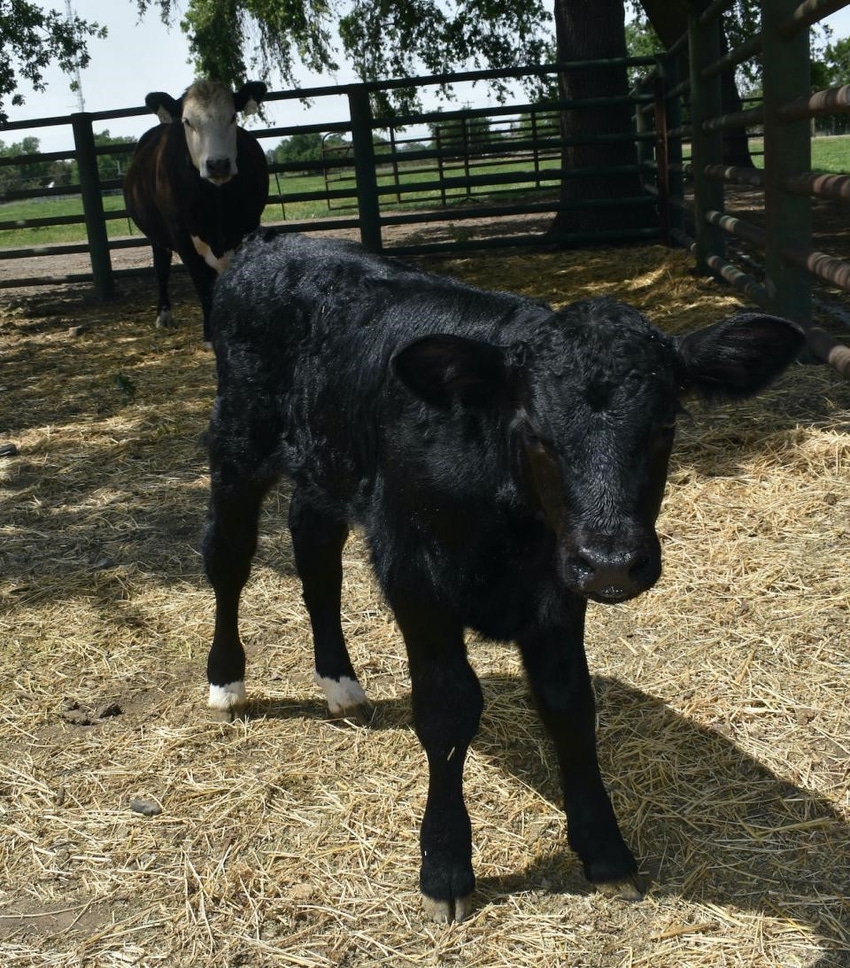Gene-edited bull calf expected to produce 75% male offspring
Calf is first demonstration of targeted gene knock-in for large sequences of DNA via embryo-mediated genome editing in cattle.
July 24, 2020

Scientists at the University of California-Davis (UC-Davis) have successfully produced a bull calf, named Cosmo, that was genome edited as an embryo to produce more male offspring.
The research was presented in a poster during the American Society of Animal Science virtual annual meeting.
Using the genome editing technology CRISPR, researchers can make targeted cuts to the genome or insert useful genes, called a gene knock-in, the university explained.
In this case, scientists successfully inserted, or knocked in, the cattle SRY gene -- responsible for initiating male development -- into a bovine embryo. It’s the first demonstration of a targeted gene knock-in for large sequences of DNA via embryo-mediated genome editing in cattle.
“We anticipate Cosmo’s offspring that inherit this SRY gene will grow and look like males, regardless of whether they inherit a Y chromosome,” UC-Davis department of animal science animal geneticist Alison Van Eenennaam said.
More males, more beef
Van Eenennaam said part of the motivation to produce more male cattle is that male cattle are about 15% more efficient at converting feed into weight gain and are more fuel efficient than females. Additionally, they tend to be processed at a heavier weight.
It could be a win for the environment, with fewer cattle needed to produce the same amount of beef.
“Ranchers could produce some females as replacements and direct a higher proportion of male cattle for market,” said Joey Owen, a postdoctoral researcher in animal science who is leading the project with Van Eenennaam.
Arduous journey
The SRY gene was inserted into bovine chromosome 17, which is a genomic safe harbor site, to ensure that the genetic elements function predictably and do not disrupt the expression or regulation of adjacent genes, the researchers said. Chromosome 17 was chosen after unsuccessful attempts to knock in the gene on the X chromosome, which would have resulted in a bull that produced only male offspring.
Cosmo is expected to produce 75% male offspring: the normal 50% XY animals and another 25% XX animals that inherit the SRY gene, the announcement said.
“It took two-and-a-half years to develop the method to insert a gene into the developing embryo and another two years to successfully establish a pregnancy,” Owen said, noting that a healthy, 110 lb. male calf was born in April 2020.
Van Eenennaam added that this is just the beginning of the research. Cosmo will reach sexual maturity in a year, and he will be bred to study if inheriting the SRY gene on chromosome 17 is sufficient to trigger the male developmental pathway in XX embryos and result in offspring that will grow and look like males.
Because the Food & Drug Administration regulates gene-edited animals as if they were drugs, Cosmo and his offspring will not enter the food supply.
Other researchers on the team include James Murray, Pablo Ross, Sadie Hennig and Jason Lin with the UC-Davis department of animal science and Bret McNabb and Tamer Mansour of the UC-Davis School of Veterinary Medicine.
This project was supported by the U.S. Department of Agriculture's Biotechnology Risk Assessment Grant Program, the California Agricultural Experiment Station at UC-Davis and the USDA National Institute of Food & Agriculture's National Needs Graduate & Postgraduate Fellowship.
You May Also Like



